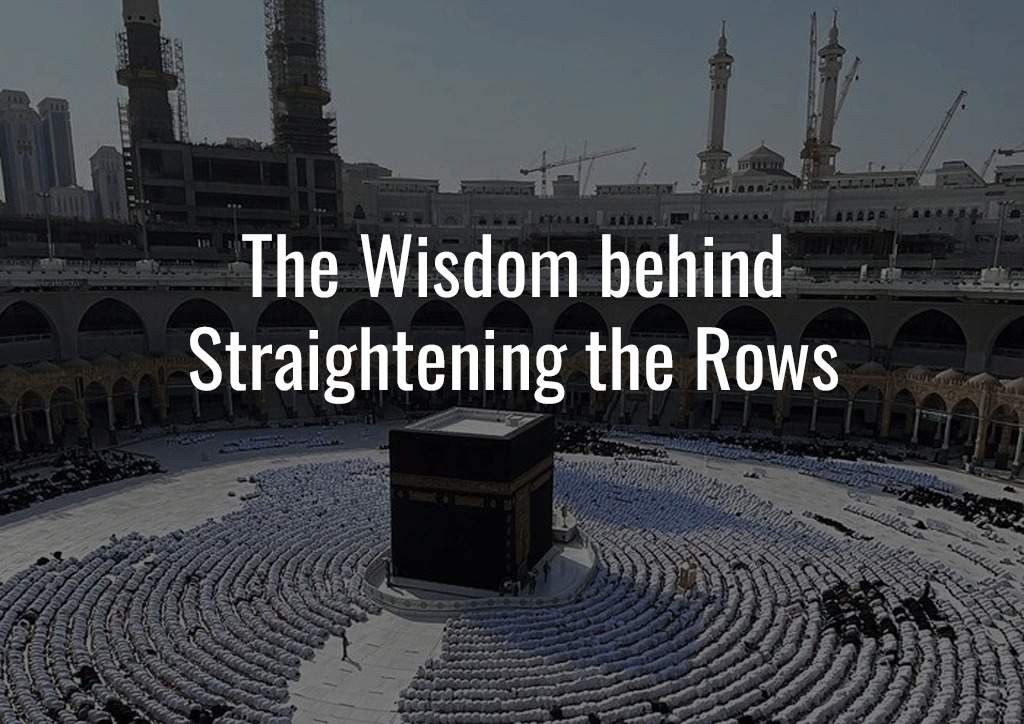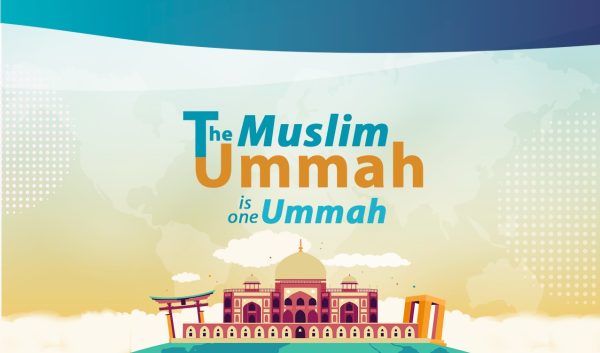Ramadan came and today feels like a dream – it went by so fast. It feels like we didn’t do enough and we could have done some more to please our Rabb. It leaves behind a sense of a wistful achievement and hope that Allah (عَزَّوَجَلَّ) has accepted our broken ibadah.
What I miss about Ramadan is the energy of iman that I felt everywhere. The moments before iftar. The barakah of taraweeh, the blessing of suhur were all witnessed worldwide. Qur’an was recited beautifully in every masjid in every corner of the world. Ramadan is most definitely a month that brings joy, peace and happiness to all Muslim.
Many Muslim men and women observed taraweeh in congregation. Every time an ibadah is experienced from the heart, a realization occurs. This realization is one that connects us to our Creator and we understand why He has given a certain command the way He did. Today I want to talk about the command for creating a straight line or saff in congregational prayer.
Before every congregational salah, the imam orders the muqtadi to straighten up the rows and it is said in many ways:
- Istawoo (استووا): Straighten up (Sahih Muslim)
- Tarassoo (تراصوا): pack up (Sahih Bukhari)
- Sawwoo Sufoofakum (سووا صفوفكم): Straighten your rows (Bukhari & Muslim)
- I’tadiloo (اعتدلوا): Up right (Abu Dawoud, weak Isnaad)
- Suddul Khalal (سدوا الخلل): bridge the gaps (Ahmad, OK Isnaad)
- Haathoo Baynal Manaakib (حاذوا بين المناكب): Align shoulders (Abu Dawoud, OK isnaad)
- Suddul Furaj (سدوا الفرج): Bridge the openings (Ibn Hibban, sound Isnaad)[1]
Allah (عَزَّوَجَلَّ) has commanded us to form straight lines in a congregation where our shoulders and our feet are to touch the person’s shoulders and feet standing besides us, and on both sides. This is not usually observed in many masjid and it’s a little sad to see that many do not understand the hikmah (wisdom) behind this very simple hadith:
It was narrated from Anas ibn Maalik (رَضِيَ ٱللَّٰهُ عَنْهُ) that the Prophet ﷺ said:
“Straighten your rows, for straightening the rows is part of perfecting prayer.”
(Al-Bukhaari: 690; Muslim: 433)
It was narrated that Abu Mas’ood (رَضِيَ ٱللَّٰهُ عَنْهُ) said:
The Messenger of Allah ﷺ used to touch our shoulders when we were praying and he would say: “Make the rows straight and do not differ, lest your hearts differ.”
(Muslim: 432)
Shaykh Ibn ‘Uthaymeen (may Allah have mercy on him) said:
The words “or Allah will cause discord among you” … this is undoubtedly a warning to those who fail to straighten their rows. Hence some of the scholars are of the view that it is obligatory to make the rows straight. They quoted as evidence for that the fact that the Prophet (SAW) enjoined it and warned those who went against his command. If something is enjoined and a warning issued against doing the opposite, it cannot be said that it is “only Sunnah”.
Hence the correct view on this matter is that it is obligatory to straighten the rows, and if the congregation does not straighten the rows, then they are sinning. This is the apparent meaning of the words of Shaykh al-Islam Ibn Taymiyah. [2]
Straightening the rows is obligatory. The idea is that no one will stand in front of anyone else, whether that is by his chest or his foot sticking out. This is how saff work. The people in chairs are on one side. Young children are to be kept behind so the saff is kept straight and focused on the worship of salah.
The area where attention is paid are the heels because they are the foundation on which the body rests. Toes do not count, because toes vary; some people have long feet and some have short feet, so what matters is the heel. [3]
No Discrimination in Islam
Hence, when people stand next to you, there is no difference between you or that person in any sort of way, whether it be culture or creed, status or looks, title or reputation. Everyone stands the same before Allah (عَزَّوَجَلَّ). The salah is offered by everyone in the same way and the rich and poor are alike. A king can be standing next to a common man and he would be a common man himself. SubhanAllah, this is the beauty of creating the straight line called saff. There is absolutely no discrimination in Islam.
Hence, we see that it is not our riches that will bring us closer to our Rabb. Everyone is the same for Him. Rather, it is our deeds that bring us closer to Him.
وَمَا أَمْوَالُكُمْ وَلَا أَوْلَادُكُم بِالَّتِي تُقَرِّبُكُمْ عِندَنَا زُلْفَىٰ إِلَّا مَنْ آمَنَ وَعَمِلَ صَالِحًا
And it is not your wealth or your children that bring you nearer to Us in position, but it is [by being] one who has believed and done righteousness.
[Surah Saba: 37]
This also reminds me of a hadith:
Abu Hurairah (رَضِيَ ٱللَّٰهُ عَنْهُ) narrated: Messenger of Allah ﷺ said,
إنَّ الله لا ينْظُرُ إِلى أجْسَامِكُمْ ، ولا إِلى صُوَرِكمْ ، وَلَكن ينْظُرُ إلى قُلُوبِكمْ
“Allah does not look at your figures, nor at your attire but He looks at your hearts [and deeds].”
[Muslim]
Connecting with Others
Creating saff and the aspect of the human touch is the biggest way to create empathy and a deep rooted connection with the one standing next to you. One has to embrace another wholeheartedly to allow them to touch their bodies to yours. One has to let go of all hatred, resentment, ill intention and stand before Allah (عَزَّوَجَلَّ) head bowed down in humility and humbleness. There is a sense of bonding and unity that is not felt otherwise. This is what Islam promotes. Love, affection and brother/sisterhood in the community to bring people closer so they realize that there is more to the world than the nuclear family system that is created by the West. Life is not about Me, Myself and I; rather there are others who co-exist with us and they also carry the same heart and feelings like us. We must worry and care for those around us rather than be in an individualistic society that the is promoted widely these days. That causes discord and disharmony where such small acts of standing in congregation and creating a saff leads to love and unity.
One verse of the Qur’an explains this:
إِنَّ اللَّهَ يُحِبُّ الَّذِينَ يُقَاتِلُونَ فِي سَبِيلِهِ صَفًّا كَأَنَّهُم بُنْيَانٌ مَّرْصُوصٌ
Indeed, Allah loves those who fight in His cause in a row as though they are a [single] structure joined firmly.
[Surah As-Saff: 4]
A saff allows this connection for the Muslim Ummah.
Discipline
Discipline is the key to Islam. We find this discipline in our timings of salah and how it has been prescribed at its time. We find this order in how our day is divided and there is a time for adhkaar with our morning and evening duas for protection. This form of discipline is witnessed with the creation of angels and how they stand before Allah (عَزَّوَجَلَّ).
وَالصَّافَّاتِ صَفًّا
By those [angels] lined up in rows
[Surah As-Saffat: 1]
Similarly, the Muslims standing in salah with an imam as the leader, creates a picture that creates a powerful image of unity and harmony. The fact is that the anti-Muslims are fearful of all the Muslim Ummah uniting as one because then only Islam would exist as the world-order, as it ought to. What if all the Muslims all around the world, instead of disputing on the petty issues came in harmony accepting and following Islam like the Sahabas did at the time of the Prophet ﷺ? What would happen to the hypocritical authorities of the world while their agends to create disparity amongst the Muslims would fail? The non-Muslims are prevented from becoming one nation with the false ideas presented to them which we naively believe to be our own and adopt ways which are anti-Islamic. Hence, this is our downfall as an Ummah.
The wisdom behind following what we think is a small Sunnah is great. We need to consider and start implementing it for the longer term benefit and gain as Muslims. Let’s not undermine the creating of straight lines as something small, rather let’s become even more mindful it from now on, In Sha’Allah. May Allah (عَزَّوَجَلَّ) unite the Muslim Ummah as one. (Aameen)

[1] https://www.quora.com/What-does-the-imam-say-before-salah-about-straightening-the-rows. Collected by AbdulAziz Ibrahim Khudair.
[2] Al-Sharh al-Mumti’, 3/6
[3] Islamqa.com











